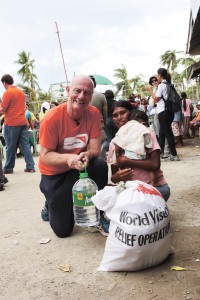When Typhoon Haiyan hit the Philippines a month ago, it brought total and utter devastation. People lost everything, and now, after the event, health concerns are a major problem.

Tim Costello in the Philippines.
Many of us are familiar with the saying, “If I’ve still got my health, nothing else matters.” When we think about the most important things in our lives, our health tends to rank highest on the list.
In the past, we confused human development with just wealth. Now we use the Human Development Index, a more holistic measure that considers not only income but also health and literacy.
As far as economic indicators go, we all know that in Australia we are wealthy. In October, Credit Suisse ranked Australia number one in the world in terms of median, per capita wealth. We have an average per capita wealth of more than US$200,000. You might think, “Well, that’s not me!” but overall it is what Australians average. And when it comes to the Human Development Index, Australia ranks number two in the world.
So what we know is that we are wealthy and we are healthy. The really big question I want to pose is, “Are we wise?” Wisdom, I think, comes from a deep sense of gratitude. It is having the perspective to be grateful to live in a wealthy country where the level of health and wellbeing is also high. That gratitude and perspective enables us to look beyond our own needs and say, “how do I allow myself and this nation to really focus on being wise?”
At Christmas, we focus on Wisdom coming into the world as a vulnerable, poor baby. Jesus is the personification of all that is wise. Wisdom is ultimately lived out in love. It is this love which is what World Vision is about. When I was in the Philippines recently following the typhoon, it struck me that the distribution of clean water, medicines and food to people who had lost everything is as close to the Gospel as you can get. It was love in action (1 John 3:18).
But it is not just people in the Philippines who are in desperate need. World Vision Australia works in more than 64 countries where access to clean water cannot be taken for granted.
In many of those countries, if you are sick and have a preventable disease, you can’t assume that you’ll get treatment. Nor can parents assume that they can provide adequate nutritious food for their children. Imagine the sense of moral panic a parent might feel when they’re unable to protect their children from hunger or illness.
Paradoxically, as the developing world makes economic progress, we are seeing more people suffering from what are termed non-communicable diseases.
These are the health consequences that flow from changes in diet and lifestyle, those more familiar to us in the rich world, like diabetes, heart disease and cancer.
The good news is that we are also seeing great progress. In 1990, 12 million children died each year. Today, it is 6 million children.
In daily figures, that means 30,000 children were dying each day, and now, less than 19,000 children die. The reason is because we have focused on those basic issues of water, nutrition, and getting medicines to people who would otherwise die.
So I take great heart, and I hope you do too, in that extraordinary moral leap of saying the world can address the plight of those living in absolute poverty. God hasn’t given up on this world. That is what we celebrate at Christmas. Wisdom has come into the world to renew, restore and remake.
In Australia, our health concerns are often more to do with mental health. Loneliness and lack of relationship, the feeling that there is no one taking an interest in you, is a profound health challenge. But the Christmas message says that we are never alone: God is always with us. As St Paul says in Acts 17:27, God is not far from each one of us.
It is crucial for the wellbeing of all people that we understand that we are social and spiritual beings. We are people who need relationship. We need to know we matter. That knowledge nourishes, not just the human spirit, but the body as well.
Two thousand years ago, God looked at this world and didn’t give up on it. Jesus came preaching the good news that the kingdom of God is at hand. In him, renewal has come.
Because of Christmas, our lives have purpose, our aloneness is removed, and the vulnerable are offered the hope that things can and will be better—as we all work together, with God, to make his kingdom of love a reality.
Have a blessed Christmas.
Email This Story
Why not send this to a friend?
